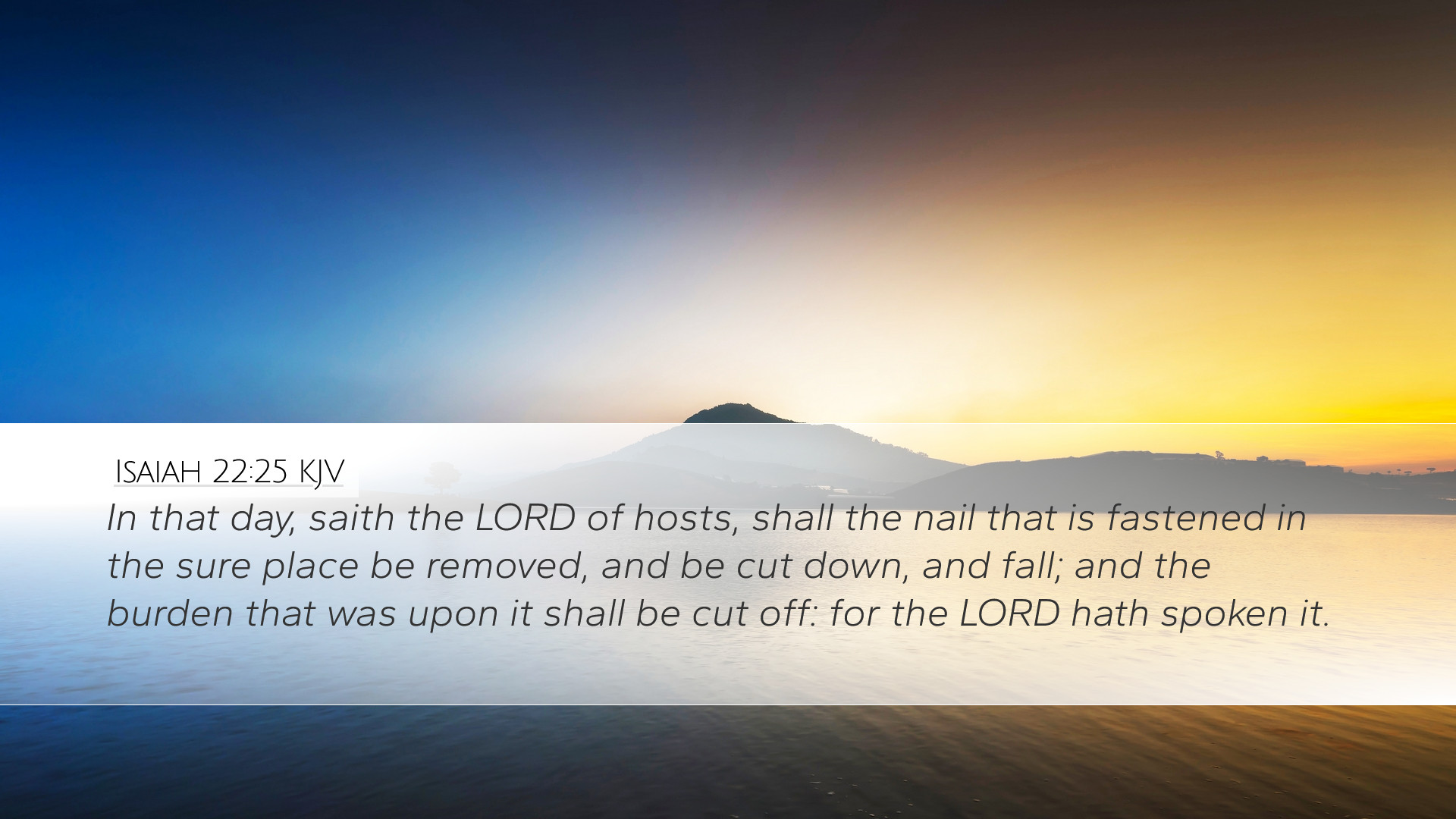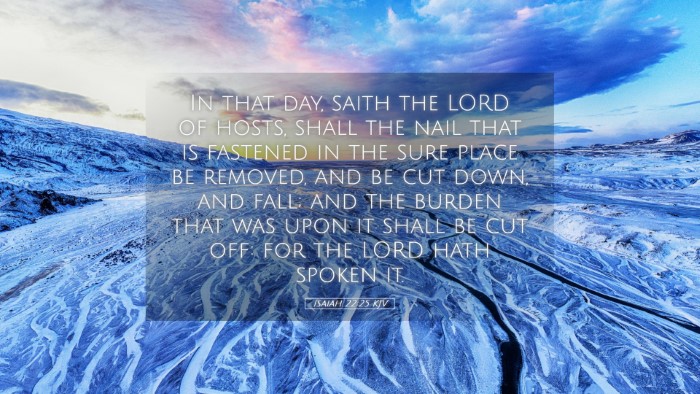Isaiah 22:25 Commentary
Verse: Isaiah 22:25 - "In that day, the Lord of hosts will take away the support of the stouthearted, and the strength of the mighty will be removed."
Contextual Overview
The book of Isaiah encompasses a profound expanse of prophetic writings that address the themes of judgment, hope, and restoration. Written during the tumultuous period of the eighth century B.C., this prophet poignantly conveys God’s messages to Judah amidst political crises and spiritual decline. Isaiah 22 specifically deals with a pronouncement regarding the fall of Jerusalem and the leadership that fails to uphold divine principles.
In this particular verse, the imagery is stark; it evokes a moment when God will intervene in a decisive manner. This intervention speaks profoundly about God's sovereignty and judgment against prideful leaders who do not align their practices with His will.
Commentary Insights
Matthew Henry's Commentary
Matthew Henry discusses the implications of divine judgment on those who rely on their strength. He emphasizes that the “stouthearted” refers to the proud and arrogant leaders of Judah, who have placed their confidence in their own abilities rather than in God’s providence. Henry suggests that their strength will be "removed," which highlights the fragility of human power in contrast to God's omnipotence.
Henry also notes that this verse serves as a warning to leaders and individuals today about the consequences of self-reliance and pride. He reflects on the idea that when the Lord removes support from those who are proud, it leads to a realization of their dependence on God, reminding readers that true strength comes from humility and faithfulness to God's guidance.
Albert Barnes' Commentary
Albert Barnes expands on the notion that the “support” mentioned in this verse symbolizes not just physical strength, but spiritual and moral support as well. He interprets this removal as indicative of a divine withdrawal of favor and assistance for those who lead with corrupt intentions.
Barnes explains that when the Lord takes away “the strength of the mighty,” He is emphasizing that human might is transient and can be stripped away at any moment. He presents a call for humility among rulers, reminding them that they are ultimately answerable to God for their stewardship and that reliance on His strength is paramount in leadership.
Adam Clarke’s Commentary
Adam Clarke adds depth to this discourse by focusing on the “day” indicated in the text, speculating that it refers to a future time of reckoning when God will establish His judgment upon Judah. Clarke underscores that the calamity inflicted is not just punitive but meant to realign the hearts of the people back to God, a theme woven throughout the Biblical narrative.
Moreover, Clarke warns that God’s discipline can be a precursor to enlightenment and restoration. He encourages leaders to lead with integrity and to seek divine wisdom, as neglecting this will bring about their downfall. The removal of the “strength of the mighty” serves as a poignant reminder that God operates outside the limitations of human effort, and His will prevails in establishing true order.
Theological Implications
This verse invites theological reflection on the nature of divine sovereignty. The act of God removing support from the powerful serves as a stark reminder that all leaders and citizens are ultimately dependent on divine grace. The strength they possess is not merely from themselves but is endowed by God for His purposes.
Theologians may find this verse crucial in discussing the interplay of judgment and mercy. Even in judgment, God's intention is the restoration of His people. The loss of support, then, becomes an avenue for repentance and an invitation to seek true humility before God.
Practical Applications
- For Pastors: This verse can be utilized in sermons addressing the importance of humility and dependence on God in leadership roles. It serves as a teaching point on the need for spiritual integrity and reliance on divine strength.
- For Students: Reflect on the consequences of pride and self-reliance in your life and studies. Isaiah 22:25 can be a poignant reminder to seek guidance and wisdom through prayer and dependence on God.
- For Theologians: Explore the themes of divine justice and mercy in God's interactions with humanity. Analyze how this verse relates to broader Biblical narratives concerning leadership and accountability.
Conclusion
Isaiah 22:25 serves as a powerful reminder of God's authority over human affairs, particularly in the realms of leadership and governance. By drawing insights from esteemed commentaries like those of Matthew Henry, Albert Barnes, and Adam Clarke, we can discern the timeless nature of God’s truth that is relevant to all who seek to lead, teach, or understand His Word. This verse calls us not only to an acknowledgment of God’s sovereignty but also to a heart of repentance and a spirit of humility as we navigate our responsibility in the church and the world at large.


